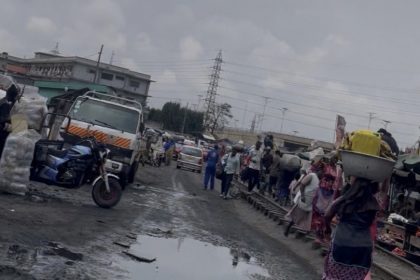Ghana, once celebrated for its lush forests, fertile farmlands, and crystal-clear rivers, is now facing a mounting environmental crisis.
Across cities, towns, and rural communities, pollution, deforestation, and climate change are threatening not only the nation’s ecosystem but the very lives of its people.
The Air We Breathe
The smell of smoke and exhaust fumes is now part of daily life in major urban areas such as Accra, Kumasi, and Takoradi.
Air pollution, largely caused by vehicle emissions, industrial activities, and open burning of waste, continues to rise.
Health experts warn that poor air quality contributes to thousands of premature deaths each year.
Residents in congested communities report increasing cases of asthma, coughing, and respiratory diseases. Yet, awareness of the danger remains low.
“The air we breathe is silently killing us,” said a public health officer in Accra. “Many Ghanaians don’t realize how much damage these pollutants are doing to their lungs.”
Rivers turned brown
Once life-giving water bodies such as the Pra, Offin, Densu, Birim and Ankobra Rivers have turned murky and toxic due to illegal mining — popularly known as galamsey.
The use of mercury and cyanide in gold extraction has poisoned water sources, devastated aquatic life, and rendered many rivers unsafe for consumption.
The Ghana Water Company Limited has repeatedly warned that some treatment plants face shutdowns due to high pollution levels. In some affected communities, residents rely on expensive sachet water as their only source of safe drinking water.
Farmers, too, are feeling the pinch. Polluted water and degraded soils have slashed yields, threatening food security across several regions.
“If our rivers die, our farms will follow,” lamented a local environmental activist, Esi Nyarko, who has been leading community clean-up campaigns in the Western Region. “We can’t eat gold, and our children deserve clean water.”
Waste and Floods
Improper waste disposal remains a stubborn challenge. Plastics litter markets, streets, and drainage systems. When rains fall, blocked gutters cause flash floods that destroy homes and claim lives — especially in low-lying areas of Accra.
Environmental analysts say the country produces thousands of tonnes of plastic waste every day, yet recycling rates remain extremely low.
Much of the waste ends up in the sea, endangering marine species and contaminating seafood that eventually lands on dinner tables.
The vanishing forests
Deforestation is accelerating, driven by illegal logging, charcoal production, and the expansion of farms and settlements.
Ghana loses thousands of hectares of forest each year, reducing carbon absorption and exposing the land to erosion and drought.
The Forestry Commission has warned that without immediate reforestation and strict enforcement of logging laws, many forest reserves could vanish within a generation.
A Changing Climate
The effects of climate change are becoming more visible. Rising temperatures, unpredictable rainfall, and frequent floods have disrupted farming patterns and destroyed infrastructure. Rural communities are especially vulnerable, as shifting weather patterns make it harder to grow food or predict harvest seasons.
Environmental scientists say Ghana’s changing climate will continue to intensify natural disasters unless urgent mitigation and adaptation measures are put in place.
The Human Cost
Environmental hazards in Ghana are not abstract problems — they are human tragedies. Rising cases of respiratory infections, waterborne diseases, and malnutrition are closely linked to environmental degradation.
Children, the elderly, and those in poverty bear the heaviest burden. In mining zones, reports of skin diseases and neurological problems linked to chemical exposure are increasing.
The Way Forward
The path to a cleaner and safer Ghana lies in collective action.
Government agencies such as the Environmental Protection Agency (EPA) and the Ministry of Sanitation and Water Resources must strengthen enforcement of existing laws.
At the same time, public awareness campaigns should promote responsible waste disposal, recycling, and the protection of forests and rivers.
Citizens also have a crucial role to play. Refusing single-use plastics, planting trees, and reporting illegal dumping or mining activities can create real change.
Call to Action Protect Ghana’s Future
Every citizen can make a difference: Refuse single-use plastics, Plant and nurture trees in your community, Avoid open burning of waste, Report illegal mining, logging, or dumping and Join local environmental clean-up initiatives.
“Protecting the environment today means protecting our children’s tomorrow,” said a spokesperson for the Environmental Protection Agency.
Conclusion
Ghana’s environment is its greatest inheritance — and its most fragile.
The fight against environmental hazards is not a task for government alone but a shared responsibility for every citizen.
If action is not taken now, the silent killers in our air, water, and soil will one day speak in disasters too great to ignore.
Protecting the environment today means protecting Ghana’s future.






